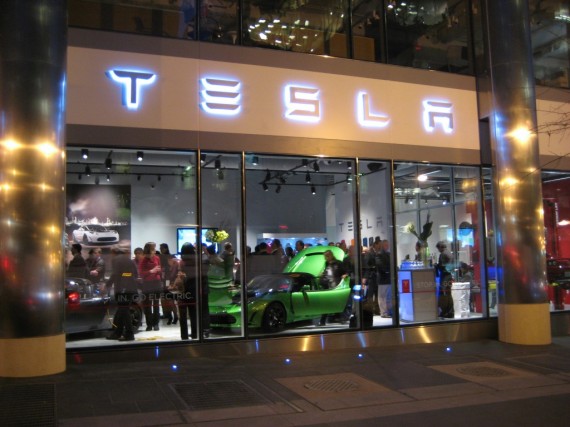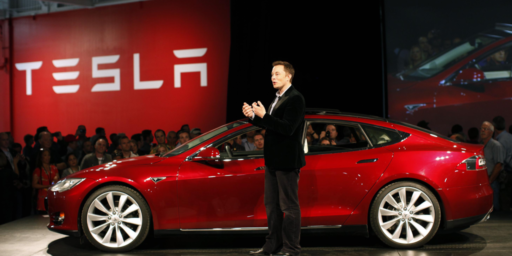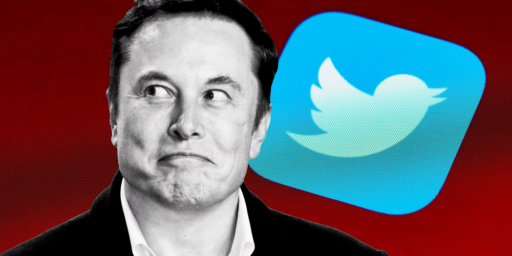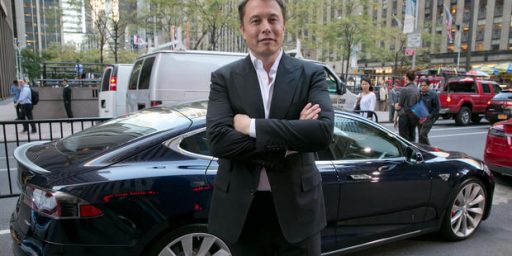An Automobile Showroom Where You Can’t Buy A Car
Thanks to archaic state laws, you can look at cars in a Tesla showroom, but in my states you can't but anything there.
Yesterday, The Washington Post profiled a showroom for cars made by Tesla Motors, the company owned by Elon Musk and known for making electric cars that most ordinary Americans can’t afford. What’s you unique about this showroom is that, while you can browse to your heart’s content, you can’t actually buy a car there:
It hasn’t been a smooth ride for Tesla Motors in Virginia.
Nearly two months ago, the electric vehicle manufacturer known for its six-figure price tags opened a gallery at Tysons Corner. Potential customers can check out the Model S, chat with employees and pick up a Tesla T-shirt or baseball cap.
But they can’t buy a car.
Virginia law prohibits car manufacturers from operating their own dealerships, partly to encourage competition and protect consumers. So the California-based company is using the Tysons Corner location as a showroom where employees are forbidden from discussing purchases.
The car manufacturer has petitioned Virginia to grant it an exemption. If granted, it could set a precedent for car manufacturers looking to sell their cars in the state without the middle man.
“This would be opening the door,” said George Hoffer, a transportation economics professor at the University of Richmond. “There would be other people, other manufacturers, especially from abroad, who would like to come in and use this business model.”
Tesla’s current model revolves around selling its products not through a dealer but directly to customers, usually online, according to Diarmuid O’Connell, Tesla’s vice president of business development.
But Tesla is hitting roadblocks like the one in Virginia across the country, most recently in North Carolina, Texas, Minnesota and New York. Forty-eight states ban or limit direct sales of automobiles, according to the Chicago Tribune.
In the future, Tesla may use both its own dealerships and independently owned ones, O’Connell said, but for now the company wants to guide customers through the new technology.
Chief executive Elon Musk has said he might take his case to Congress or the federal courts. “If we’re seeing nonstop battles at the state level, rather than fight 20 different state battles, I’d rather fight one federal battle,” Musk told Automotive News in April.
As the article goes on to note, Tesla has attempted to go through the processes required by the Virginia Department of Motor Vehicles in order to get an exemption to the general rule forbidding direct manufacturer sales in the state but keeps finding itself rebuffed by requests for more information, most of them focused on the question of whether or not they’d taken appropriate steps to find a licensed Virginia dealer to run a showroom. A quick Google search reveals that the company is engaged in similar regulatory battles in Texas and New York. Quite obviously, regulations like these are designed to ensure that the right to sell cars to the public is limited to a cartel of dealers, who unsurprisingly have significant political influence in Virginia politics. This isn’t just a Virginia problem, though. NPR recently profiled a businessman named Matthew Painter who wanted to establish what he called “virtual dealerships” that would see directly to the public, only to find himself running right into Alabama’s statute’s on the subject:
Painter was stopped by a web of state laws that make it very, very difficult to change the way cars are sold. Laws like Alabama statute 8-20-1-13:
Limitations on cancellations, modification, terminations and non renewals of franchise relationship.
Almost every part of the car buying process is enshrined in laws like this one. They restrict where new dealerships can open, giving dealers the exclusive right to sell within their territory. This makes it almost impossible to create an online dealership.
What’s more, the the laws make it very hard for manufacturers to close exiting dealerships. Manufacturers don’t have leverage over dealerships if they want them “to provide good customer service, low prices, nice facilities, or anything else,” says Yale economist Fiona Scott Morton. “That [dealer] gets to stay as long as he wants, and if he does a bad job, that’s just what he does,” she says.
Car dealers argue that the laws are necessary to protect dealers’ investment, and to protect the jobs of people who work at car dealerships.
Car dealers argue that the laws are necessary to protect dealers’ investment, and to protect the jobs of people who work at car dealerships.
“If you just take our organization alone, we employ over 2,000 people,” says Tammy Darvish, who runs a group of auto dealerships and sits on the board of the National Automobile Dealers Association. “That’s 2,000 families throughout greater Washington that are dependent on us continuing our business operations.”
There are plenty other businesses employ lots of people but don’t have so much protection from state laws.
That may partly be due to the fact that car dealers have a lot political power. Dealers contribute a big share of state sales tax revenues — as much as 20 percent in some states — and they tend to be big local employers. That makes state and local legislators listen.
Matthew Yglesias touched on this issue of the political power of dealers as opposed to that of manufacturers yesterday:
This is one of these crazy kinds of public policy that it would be extremely hard to get off the ground nowadays, but once entrenched it is extremely difficult to dislodge. Precisely because of pointless rules about auto dealerships, there are auto dealership companies headquartered all around the country. That means most state legislators and all members of Congress represent a guy who owns an auto dealership. Car companies, meanwhile, are headquartered in Michigan or Germany or Japan and even though they’re much bigger than dealerships, the dispersed and widespread nature of the car dealership industry gives them extra lobbying ooomph.
Major auto companies and the dealerships they “partner” with are engaged in basically a constant low-intensity political conflict, but when Elon Musk decided he wanted to reinvent the automobile, he decided to try to reinvent the business model as well. Consequently, Tesla doesn’t truck with a network of middlemen.
That’s not going to easy, though. As we’ve seen just from the examples of states like Virginia, Texas, New York, and Alabama, car dealers in the individual states have essentially created a cartel system that requires manufacturers to go through them in order be able to sell cars to the public. This is one of the reasons why some of the pieces of General Motors and Chrysler that ended up getting sold off in their respective bankruptcies, such as the Hummer brand and others, ended up being bought as much for their established dealer networks as anything else Additionally, Fiat’s decision to come to the rescue of Chrysler means that company now has ready access to a nationwide chain of dealerships in the United States not just for the Chrysler and Jeep brands, but also for Fiat which hasn’t had significant access to the American market for a very long time. More importantly, as Yglesias points out, the relative political power of dealers at the state level is such that it seems pretty unlikely that we’ll see any change in these laws any time soon. Despite Elon Musk’s threat of Federal litigation, I doubt that Federal lawsuits in this area are going to to accomplish much of anything.
There is plenty about buying a car that is fundamentally silly. The idea of having to go through dealers who, thanks to state law, are able to force manufacturers to deal with them, is just one of them. Unfortunately, it seems to be one aspect of American business that’s going to be very hard to change. I give Musk, Painter, and others like them credit for trying to reinvent the way that we buy cars, but they’ve got a tough road ahead of them.





I assume all of the market-worshipers are fighting to tear down this cartel? I thought not….
Tesla is such a disruptive force I almost want to buy their cars on that principle alone. They are taking on big-oil, auto dealers, changing the service model away from a profit center (because they require so little of it) and introducing a level of customer service unheard of in the industry.
I suppose I’d be scared, and fighting with every tool I had available if I was part of the auto industry. Elon is one smart cookie.
Oh, and now I’m reading rumors that Musk is talking with Google about adopting the self-driving technology.
As an example of the influence of car dealerships, the McCombs Business School at UT Austin is named after Red McCombs, the largest auto dealership owner in San Antonio. His net worth is estimated at $1.4 billion dollars.
Well, the Roberts Court just held that any law based on outdated data is unconstitutional, didn’t it?
I don’t have numbers on this but anecdotally I’m seeing a surprising number of Teslas on the roads here in Marin County. I’m also seeing a lot of Chevy Volts. I keep hearing people claim that electrics don’t make sense, but I’m not seeing either Teslas or Volts broken down by the side of the road. Nor do I see used ones for sale.
As goes California, so goes the rest of the country eventually.
@nightrider: No.
@michael reynolds: I’ve only seen one Tesla Model S in the wild here in the DC Metro area, at least since I became aware of them a few weeks ago. I don’t see many Volts, although there are lots of Priuses (Prii?).
I see a fair amount of cars sold second-hand on the internet on places like Craigslist and other online sites. Maybe Tesla is going about this wrong – if they technically sold their cars to a third-party company which then provided financing while selling the cars to customers, they might be able to get around the ban on manufacturers doing direct sales.
Several of my friends have the Tesla S and are giving it rave reviews, as are some of the racers I have talked to recently. I have been seeing a pretty decent number of Volts around here as well.
Consumer Reports recently called the Tesla S “the best car we have ever reviewed” – I am not sure how the knee jerk electric haters can respond to that effectively.
Even worse is the Studebaker Motor Company, which only has drawings of cars that they would love to build if only they actually had the money to build some cars.
@michael reynolds: @James Joyner:
I live out in Virginia horse country where there are potentially people wealthy enough to afford a Tesla. I can’t say I’ve seen any of those, but I’ve seen a few Chevy Volts